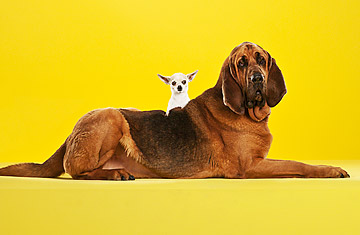
Since 1995, John Mitani, a primatologist at the University of Michigan, has been going to Uganda to study 160 chimpanzees that live in the forests of Kibale National Park. Seventeen years is a long time to spend watching wild animals, and after a while it's rare to see truly new behavior. That's why Mitani loves to tell the tale of a pair of older males in the Kibale group whom the researchers named Hare and Ellington.
Hare and Ellington weren't related, yet when they went on hunting trips with other males, they'd share prey with each other rather than compete for it. If Ellington reached out a hand, Hare would give him a piece of meat. If one of them got into a fight, the other would back him up. Hare and Ellington would spend entire days traveling through the forest together. Sometimes they'd be side by side. Other times they'd be 100 yards apart, staying in touch through the foliage with loud, hooting calls. "They'd always be yakking at each other," says Mitani.
Their friendship--for that's what Mitani calls it--lasted until Ellington's death in 2002. What happened next was striking and sad. For all the years Mitani had followed him, Hare had been a sociable, high-ranking ape. But when Ellington died, Hare went through a sudden change. "He dropped out," says Mitani. "He just didn't want to be with anybody for several weeks. He seemed to go into mourning."
For evolutionary biologists and anthropologists, friendship has been considered one of the core traits of only one species of ape: us. The conventional thinking held that, along with our capacity to feel love, loyalty and compassion, our ability to forge long-term, meaningful bonds with friends set us apart. To the degree that nonhuman animals have exhibited such traits, they're really just making a genetic calculation. They'll protect family members, but only because they share so many genes. They'll help an unrelated member of their species too, but that's an even colder transaction known as reciprocal altruism: I'll do you a favor today, but I expect one in return tomorrow.
Humans do this kind of interpersonal ledger balancing too. It's not for nothing that if a friend lends you $10, you feel a faint sense of unease until you pay it back. If we didn't all feel that, Homo sapiens would not have become as cooperative a species as it is. But reciprocal altruism is to friendship as reproduction is to romance. In both cases, we start with a primal impulse and then embroider deep feeling into it. Animals, we've always told ourselves, do nothing of the kind.
Mitani and his colleagues now know better. Unrelated chimpanzees, for example, can develop strong bonds that last for years, and long-term studies by other researchers have revealed durable friendships beyond the chimp species. Dolphins make friends with unrelated dolphins, hyenas make friends with hyenas, and the same is true for elephants, baboons and horses. No one can say how many more species--mammals and others--will be added to the list.
